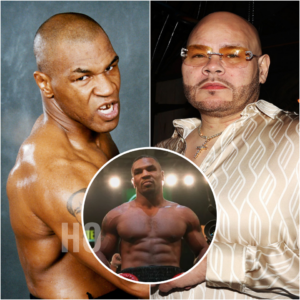“Don’t be fooled about Mike!” – Celebs open up about Mike Tyson… | HO
Mike Tyson is one of the most influential people in boxing if not the world and is widely respected around the globe. In this video we take a look at what some of the most famous people think about Mike Tyson
We edit some of the best interviews and speeches of Mike Tyson into short video clips so that you can get the most value from them in the least amount of time. Mike Tyson has spoken a lot of valuable words in his life and this channel’s purpose is to transform his knowledge about boxing and life and bring it to you in the easiest way we can.

Mike Tyson’s life story reads like a screenplay full of extreme highs and profound lows, embodying the quintessential American tale of redemption and transformation. His journey from the streets of Brooklyn to the summit of global boxing, followed by a tumultuous descent and eventual personal rebirth, provides rich material for understanding the complexities of fame, talent, and personal growth.
Born on June 30, 1966, in Brooklyn, New York, Michael Gerard Tyson encountered a rugged start to life, finding himself entangled in a web of petty crimes and juvenile delinquency. His early life was marred by frequent arrests—38 times by the age of 13—a testament to his tumultuous youth dominated by instability and hardship. The death of his mother when he was just 16 left Tyson in the care of his boxing manager and trainer, Cus D’Amato, who would become a father figure and guiding light, providing both discipline and direction.
Under D’Amato’s tutelage, Tyson’s raw power was harnessed and refined, paving the way for his eventual debut as a professional boxer at the age of 18. His style was ferocious; his approach in the ring was predatory, often overwhelming his opponents with sheer power and aggression. This fierce fighting style quickly earned him the nickname “Iron Mike,” and by 1986, at the tender age of 20, Tyson had become the youngest heavyweight champion in history.
Tyson’s dominance in the ring during the late 1980s was unparalleled. He became an international sensation, not only for his prowess and success but also for the dramatic flair and intimidation he brought to the sport. His rapid rise was matched by substantial financial earnings, making him one of the richest athletes of his time. However, the zenith of his career also sowed the seeds of his eventual downfall.
Upon his release in 1995, Tyson attempted to reclaim his position in boxing but was never quite able to capture the invincibility of his earlier years. His comeback was marred by controversy, including the infamous 1997 bout against Evander Holyfield, where Tyson was disqualified for biting Holyfield’s ear. These incidents further tarnished his image and made him a figure of intense public scrutiny and criticism.
Despite the numerous setbacks, the new millennium brought a gradual change in Tyson’s life. His retirement from professional boxing in 2005 allowed him to focus on personal growth and rehabilitation. He ventured into entertainment, appearing in films and television shows which showcased his charisma and a newfound sense of humor, often poking fun at his tumultuous past.
Moreover, Tyson embraced family life with his third wife, Lakiha “Kiki” Spicer, who he credits with helping him find stability and peace. His transformation from a feared boxer to a doting father and husband marked a significant turn in his personal narrative. Tyson also battled with substance abuse and mental health issues, openly discussing his struggles in a manner that helped destigmatize these issues among his fans and the broader public.
Today, Mike Tyson is a figure of complexity, embodying both the pitfalls of early fame and fortune and the potential for personal redemption. His story serves as a powerful reminder of the human capacity for change and the relentless spirit required to overcome personal demons. Tyson’s life underscores the notion that one’s past does not dictate the future, and with determination and support, it is possible to rewrite one’s story in the face of overwhelming odds.
In his own words, Tyson wishes to be remembered not just as a champion in the ring, but as a man who faced his darkest moments and emerged with a renewed spirit and purpose. His legacy, therefore, is not solely defined by his athletic achievements, but equally by his journey towards personal redemption and his ongoing efforts to contribute positively to the lives of others, especially those who face struggles similar to what he once endured. Mike Tyson’s life is a testament to the enduring human spirit, proving that even the most iron of wills can be shaped into something profoundly meaningful.
News
“Fucking nightmare, Iron Mike chased me round a car 20 times, thought he was gonna kill me”: Fat Joe talks about a crazy story about Mike Tyson!😮💨 | HO
“Fucking nightmare, Iron Mike chased me round a car 20 times, thought he was gonna kill me”: Fat Joe talks about a crazy story about Mike Tyson!😮💨 | HO ‘We about to get knocked out’ Rapper Fat Joe shares a…
HO – ‘WHAT?’: Olivia Dunne shares Taylor Swift Travis Kelce TikTok after starring alongside the Chiefs Super Bowl winner in energy drink commercial
HO – ‘WHAT?’: Olivia Dunne shares Taylor Swift Travis Kelce TikTok after starring alongside the Chiefs Super Bowl winner in energy drink commercial Olivia Dunne has shared a hilarious behind-the-scenes TikTok featuring Travis Kelce and referencing his girlfriend Taylor Swift after the pair starred in a new…
HO – Travis Kelce to compete with Chiefs teammate Patrick Mahomes as the duo earn Nickelodeon Kids Choice Awards nominations… while tight end’s girlfriend Taylor Swift also gets a nod
HO – Travis Kelce to compete with Chiefs teammate Patrick Mahomes as the duo earn Nickelodeon Kids Choice Awards nominations… while tight end’s girlfriend Taylor Swift also gets a nod Travis Kelce will compete against his running mate Patrick Mahomes for a Nickelodeon…
HO – WNBA game between the Chicago Sky and Indiana Fever that featured the controversial foul on Caitlin Clark averaged over a MILLION and a half viewers – an over 300% increase from 2023
HO – WNBA game between the Chicago Sky and Indiana Fever that featured the controversial foul on Caitlin Clark averaged over a MILLION and a half viewers – an over 300% increase from 2023 The WNBA‘s Chicago Sky-Indiana Fever game that featured…
HO – “All Good”: Caitlin Clark Had The COOLEST Reaction To Being Called A “White B****” By Pat McAfee
HO – Caitlin Clark Had The COOLEST Reaction To Being Called A “White B****” By Pat McAfee Caitlin Clark has offered a reaction to being called a “White B-” by Pat McAfee, according to Pat Mcafee himself. The ESPN show host crossed a line…
HO – NFL Fans Are Worried About Tua Tagovailoa After Shocking New Photo Emerges Of The Dolphins Quarterback
HO – NFL Fans Are Worried About Tua Tagovailoa After Shocking New Photo Emerges Of The Dolphins Quarterback Tua Tagovailoa has been the subject of many conversations this off-season after the Miami Dolphins were knocked out of the NFL playoffs in the…
End of content
No more pages to load











